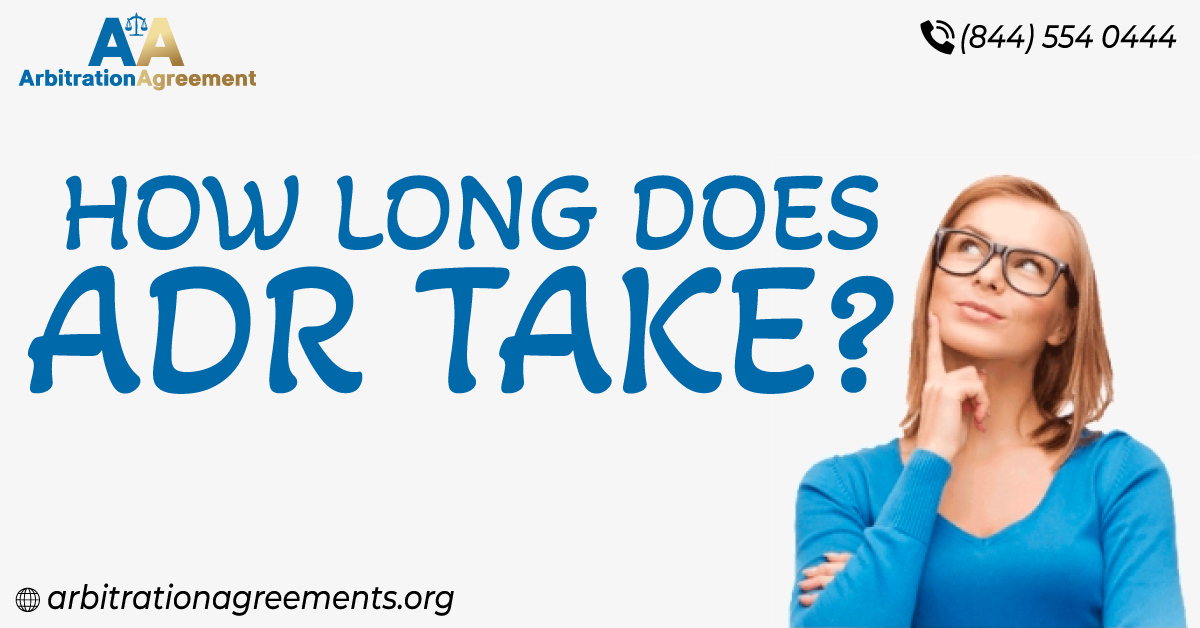How Long Does ADR Take?
Nitin Paul Harmon
July 27, 2023, 11 a.m.
...
Nitin Paul Harmon
July 27, 2023, 11 a.m.
...
Alternative Dispute Resolution (ADR) is widely recognized as a viable method to manage conflicts and disputes, both personal and professional. By offering a platform that avoids the cost and stress associated with traditional court proceedings, it has become a preferred way to solve disputes for many individuals and corporations. A common question often asked by those considering this method is, "How long does ADR take?" This article will shed light on this crucial question.
Before diving into the timeline of ADR, it's crucial to understand what this conflict resolution approach entails. Do you want to know what is the difference between arbitration and mediation? ADR is an umbrella term that encompasses various methods of settling disagreements outside of the traditional court system.
The most common types of ADR are mediation, arbitration, and negotiation. Each of these methods has a different approach, yet they all share the same goal: resolving disagreements in a way that is less formal, less adversarial, and often quicker than traditional litigation.
The duration of an ADR process is not set in stone and can vary greatly depending on several factors.
While it is challenging to provide an exact timeframe due to the factors mentioned earlier, it's possible to present a general timeline based on average durations of different ADR methods.

Despite the varying durations, one of the key attractions of ADR is that it is generally faster than traditional court proceedings, which can take several years. Know how mediation defined? ADR provides a more expedited, cost-effective, and private avenue for dispute resolution. It grants parties more control over the process, enabling them to work collaboratively towards a mutually beneficial outcome.
While ADR methods are generally quicker than litigation, there may be instances where parties wish to expedite the process further. Here are some strategies that can help facilitate a quicker resolution.
Modern technology has significantly impacted the timeline of ADR. Do you want to learn more about arbitration vs mediation vs litigation? For example, Online Dispute Resolution (ODR), a subset of ADR, employs technology to settle disputes virtually. ODR has been especially useful during times when in-person meetings are not feasible, such as during the COVID-19 pandemic. It provides a platform for parties to engage in mediation, negotiation, or arbitration from their own homes or offices, thereby saving time and making the process more convenient.
Furthermore, technology such as AI and machine learning is being increasingly incorporated into ADR, assisting in areas such as data analysis, pattern recognition, and even predictive outcomes. Read more about Arbitration Agreement Association. These technological advancements hold the promise of making ADR even faster and more efficient in the future.
While speed is often seen as one of the major advantages of ADR, it's important to remember that the ultimate goal is a fair and satisfactory resolution. Therefore, the emphasis should not solely be on how quickly a dispute can be resolved, but on the quality of the resolution achieved.
Taking the necessary time to fully understand each party's position, explore potential solutions, and reach a mutually beneficial agreement can be more beneficial than rushing to an unsatisfactory or unsustainable resolution. Learn more about arbitration agreement meaning information. While ADR can often provide a quicker resolution than litigation, it should not come at the expense of thoroughness and fairness.
The role of ADR professionals, such as mediators or arbitrators, is critical in shaping the duration and outcome of the ADR process. Their skills in facilitating discussions, managing conflicts, and guiding parties towards resolution can significantly influence how quickly a dispute is resolved. Want to know arbitration clause & provision? Therefore, the selection of a well-qualified, experienced professional can be a deciding factor in both the duration and the success of the ADR process.
The future of ADR looks promising, especially with advancements in technology and an increased focus on alternative methods of dispute resolution. Do you want to know how non-binding arbitration works? As ADR evolves, it is likely to become even more efficient, offering quicker and more effective solutions for a wider range of disputes.
The duration of Alternative Dispute Resolution depends on a multitude of factors, including the type of ADR method, complexity of the dispute, parties involved, and the mediator or arbitrator's efficiency. Do you want to know who pays for mediation? Despite the potential variability in timeframes, ADR processes are typically more efficient and quicker than traditional litigation, making them an appealing option for many. As such, when considering how long ADR may take, it's beneficial to weigh these factors against the potential time and cost savings that ADR provides.